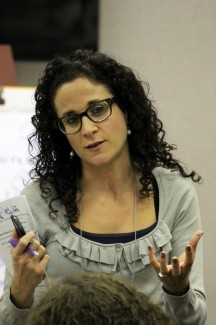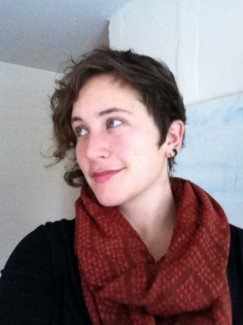Rabbi Stephanie Kolin is an alum of JOIN’s Seminary Leadership Project and is on JOIN’s Board of Directors. Also highlighted: Rabbi Noah Farkas, JOIN Seminary Leadership Project alum and Board Member, and JOIN trainers, Jeannie Appleman and Meir Lakein.
by Rachel Heller Zaimont

Rabbi Stephanie Kolin / Photo by David Miller
Check out the Jewish Journal’s companion article about Rabbi Stephanie Kolin’s work as Lead Organizer of Reform CA, a statewide campaign for justice in California, and their victory on statewide immigration reform.
On a brisk December evening, Rabbi Stephanie Kolin stepped up to a microphone to address some 50 immigrants and advocates from a cross-section of civil rights organizations, including Advancing Justice-Asian Law Caucus and the National Day Laborer Organizing Network. They’d come together to celebrate at the UCLA Downtown Labor Center near MacArthur Park after three years working side by side, petitioning lawmakers to support the Trust Act.
The new California law, signed into law by Gov. Jerry Brown in October, will curtail deportations of undocumented immigrants throughout the state. Kolin, 35, a rising leader of the Reform movement, came to the event as part of Reform CA, one of the newest Trust Act coalition members; since last spring, she had been working tirelessly with more than 125 Reform rabbis from across California to build Jewish support for the measure and to help push the bill through the state government.
“Many in this room have been working for years … to make sure that today’s aspiring Americans can breathe the breath of dignity and fairness, and experience freedom from the fear that comes when one is treated as the enemy in one’s own home,” Kolin said, as a translator repeated her words in Spanish.
“There’s a phrase we say that I want us to be able to share,” she continued, spreading her arms. And despite the language differences in the room, despite vast cultural differences, her message came through, and the entire audience joined her in chanting the Hebrew words: “Chazak, chazak, v’nitchazek.” Be strong, be strong, and we will be strengthened by one another.
“May our communities continue to join together to address the vast issues of our broken society,” said Kolin, whose voice and enthusiasm filled the room, “to build the power that it takes to make real change, and to strengthen one another to do what is right and good in our world.”
A rabbi by training, Kolin’s passion is community organizing, and she has blended her twin callings as co-director of Just Congregations, the community-organizing program of the Union for Reform Judaism (URJ). There, she has taken the role of lead organizer of Reform CA, a statewide campaign for political change (see accompanying story). More than 250 Reform congregations across the United States are now engaged in community organizing, along with other kinds of social justice work, fueling a growing demand for organizers and rabbis fluent in the language of organizing within mainstream Jewish institutions. Since relocating to the West Coast in 2010, Kolin has dedicated her energy to the pursuit of tikkun olam, compassion and connection in both the Jewish and public sphere. In 2013, she was named to Newsweek/The Daily Beast’s “Rabbis to Watch” list for her work.
“What I’m called to is the fundamental tools of organizing — story sharing, systemic change, collaborating with others, interfaith work, moving the world toward greater justice and compassion,” she said. “You know you have the right job when it doesn’t feel like you’re working.”
Kolin’s enthusiasm is always apparent; even though she maintains an almost dizzying schedule of meetings, conferences and responsibilities around the state and country, she approaches each task with humor and zest.
“She’s a rock star,” said Rabbi Rick Jacobs, president of the URJ. “She is gifted in everything that a rabbi of the 21st century needs to be gifted in: She’s really smart, she’s a phenomenal communicator, and she has the ability to galvanize people around things that really matter. And she’s got a great sense of humor — she’s the kind of person you love hanging around with.”
Those social skills come in handy, because much of Kolin’s job entails spending time with a lot of people in a lot of places. She divides her time between Los Angeles and the Bay Area, with a constant string of conferences from San Diego to Chicago sprinkled into the mix. (She mentioned in an interview that she doesn’t like to fly, but when she does, she wears Superman socks outfitted with tiny red capes.)
Kolin and her older brother, Ben, grew up at East End Temple in Manhattan, N.Y., a Reform synagogue where their parents helped found the religious school. The siblings always sat in the front row for Friday night Shabbat services.
Kolin clearly remembers the day she first considered becoming a rabbi. It was Purim, and Kolin, then in seventh grade, was “goofing off” on the bimah with her rabbi. At one point, the rabbi, Deborah Hirsch, turned to Kolin and motioned to her chair on the bimah. “Do you want to sit there?” Hirsch asked.
“Why?” Kolin inquired.
“I just have a feeling,” the rabbi answered.
“That was the first moment that my eyes were shifted to this possible path, and they never moved from that path,” Kolin said.
In high school, she immersed herself in the Reform youth group North American Federation of Temple Youth, where she got her first taste for leadership. But her social justice muscle was still developing. “I was never a very political person,” she said. “I grew up with incredible values, and was always deeply affected by suffering. But I didn’t know there were ways to enact change. I just knew people were hurting, and as Jews it was our job to address that somehow.”
It was while double-majoring in sociology and Near Eastern Judaic studies at Brandeis University that Kolin found structure for her natural empathy. In a class she took with sociologist Maury Stein, students engaged in weekly meditation in pairs. The experience was “incredibly transformative,” she said, and altered her view of what it meant to relate to others. “It taught me a new way to listen, to look at people, to express my own story and to understand that if we are to be present with each other’s pain, maybe we can create a different kind of world.”
Kolin went straight from college to rabbinical school; there was no question it would be her next step. While attending Hebrew Union College-Jewish Institute of Religion (HUC-JIR) in New York, she volunteered as coordinator of the campus soup kitchen. Every Monday night, she would listen to the guests’ personal narratives of powerlessness and hardship. “The more I heard the stories, the more hopeless things felt,” she said, until a colleague introduced her to someone she thought might offer solace: a community organizer.
Jeannie Appleman worked with Interfaith Funders, a grant-making network that supports congregation-based community organizing, and she sent Kolin to a 10-day summer training course with the Industrial Areas Foundation (IAF), the first and largest community-organizing network in the country, founded by Saul Alinsky, in Chicago. There, Kolin saw how the conversations that had troubled her could be harnessed as more than fleeting exchanges; they became the basis of community organizing, which she soon recognized as her calling.
“These things that I thought were just values, it turns out that they were also tools,” she said. “That’s when I learned that the awakening experience I’d had in college was something to not only feel and notice, but also act on.”
That fall, when she returned to rabbinical school, she knew she wanted to find a way to share the lessons that had inspired her. So she worked with Appleman and a fellow student — Rabbi Noah Farkas, now at Valley Beth Shalom — to create a course in community organizing and leadership at HUC-JIR. (At the New York campus, the course is taught today by Kolin’s personal mentor, Meir Lakein, director of organizing at the nonprofit JOIN for Justice. In Los Angeles, Kolin herself co-teaches the class with members of OneLA-IAF, a nonprofit community-organizing group.)
Continue reading this article in the Jewish Journal by clicking here.






 It feels like a superpower: to know how to stop time, command presence with another being, and articulate the gift that says, “I see and love you. Keep going.”
It feels like a superpower: to know how to stop time, command presence with another being, and articulate the gift that says, “I see and love you. Keep going.”


